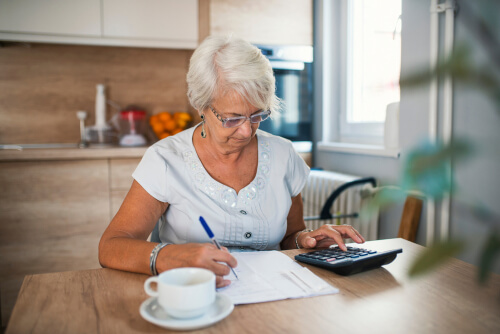
Page contents
- Which women may be eligible for back pay in state pension?
- How many women have been underpaid their state pension?
- How much unpaid state pension could I be owed?
- Parliamentary Ombudsman launches investigation
- How do I find out if I am owed more state pension?
- How much State Pension do women get?
- What is the State Pension age for women?
- WASPI Women
Page contents
- Which women may be eligible for back pay in state pension?
- How many women have been underpaid their state pension?
- How much unpaid state pension could I be owed?
- Parliamentary Ombudsman launches investigation
- How do I find out if I am owed more state pension?
- How much State Pension do women get?
- What is the State Pension age for women?
- WASPI Women
Thousands of women in the UK may be receiving too little state pension. An error by the Department for Work and Pensions (DWP) means a huge number of older women have been underpaid and are owed nearly £7,000 in state pension back pay.
Women most likely to have been underpaid include widows, divorcees and those who depend on their husband’s pension contributions for some of their pension entitlement. Other eligible women are those who reached state pension age before April 2016 and women aged 80 and over.
Pensions consultancy firm Lane, Clarke & Peacock (LCP) flagged the underpayments in May 2020 and since then the DWP has been reimbursing eligible women, with an official repayment scheme in place since January 2021.
The discrepancy is due to computer errors coupled with a failure by the DWP to increase women’s state pension payments when their husbands reached state pension age, or when they reached the age of 80 or had died.
Which women may be eligible for back pay in state pension?
The underpayment only relates to women who reached state pension age before April 2016. If you turned 65 after that date, you will be receiving the new state pension amount and the underpayment does not apply.
What groups of women are eligible for back payments?
- Married women with low pension entitlements (because they had gaps in their National Insurance record), who reached state pension age before April 2016, had the option to claim a state pension based on their husband’s records of National Insurance contributions. The pension was 60% of the basic pension rate with eligibility from when the husband reached state pension age. From 2008, the claim was done automatically by the DWP but prior to this, women would have had to put in a claim to get the extra money.
- Widows should have seen their pension increase when their husband died as depending on their late husband’s contribution record, they should have been receiving up to 100% basic state pension as well as at least 50% of his additional state pension.
- Women who divorced after retiring may be eligible for back payments provided they have not remarried.
- Women aged 80 and over, regardless of their national insurance contribution record, as long as they pass a basic residency test.
- Sons/ daughters and widowers of women whose state pension may have been underpaid during their lives, particularly where the husbands turned 65 after March 2008.
- Women getting the graduated retirement benefit (GRB) of £1 a week under the scheme which ran from 1961-1975. Nearly 24,000 women are getting GRB.
How many women have been underpaid their state pension?
The DWP says it wrote to women affected but many say they never received a letter, which is why so many women may still be owed thousands of pounds. Thousands of women are thought to have died without ever receiving the correct pension.
Sir Steve Webb, a former pensions minister who is now a partner at consultants LCP which highlighted the discrepancy, has estimated that over 230,000 women are thought to have been underpaid by the DWP.
How much unpaid state pension could I be owed?
The latest data from the DWP in March 2024 shows £571 million has already been repaid since the correction exercise began in January 2021.
The Department for Work and Pensions (DWP) released its latest update on the progress of the State Pension Underpayments Legal Entitlements and Administrative Practice (LEAP) exercise, showing 97,016 pensioners over State Pension age, mostly women, have received back payments ranging from £2,192 to £12,486 depending on their pension bracket.
Parliamentary Ombudsman launches investigation
The Parliamentary Ombudsman has now launched an investigation into the issue after LCP highlighted that women did not realise they had to make a second claim for an uplift to their pension once their husband retired.
The only way women were notified that they had to claim was on their husband’s state pension form
In March 2008, the rules were altered so the uplift to women’s pensions took place automatically.
Steve Webb of LCP called the investigation a “major milestone and said “these women fell victim to a fundamentally sexist and archaic system which relied largely on married men ticking boxes and passing on claim forms to their wives”.
How do I find out if I am owed more state pension?
The easiest way is to ring the Pension Service on 0800 731 0469.
You can write to them at:
The Pension Service
Post Handling Site A
Wolverhampton
WV98 1AF
Make sure you have:
- Your name, your date of birth and your National Insurance number
- Your current annual basic state pension
- Your husband’s name, date of birth (and date of death if this applies) and NI number
- His current basic state pension, or last known before he died
If it seems very complicated you can always ask a financial adviser to help you.
A DWP spokesperson said: “The action we are taking now will correct historical underpayments made by successive governments. We are fully committed to addressing these errors, not identified under previous governments, as quickly as possible.”
How much State Pension do women get?
Women born on or after April 6, 1953, can claim the new State pension. In 2024/25 this is £221.20 per week, or £11,502 annually.
In April 2025, this will rise to £230.30 weekly, or £11,975 annually.
To claim the new State Pension you need 35 qualifying years on your National Insurance record to get the full amount.
Women born before these dates can claim the older basic State Pension. This is currently worth £169.50 per week, or £8,814 annually.
In April 2025, the basic State Pension will increase to £176.45 weekly, or £9,175 annually.
What is the State Pension age for women?
The State Pension age has been changed so it is now the same for both men and women.
The State Pension age at the moment is 66.
Between 2026 and 2028, the State Pension age is going to rise to 67. This will affect people born on or after April 1960.
From 2044, the State Pension age will rise to 68. This will affect people born after April 1977.
Both men and women who have private or workplace pensions can access their savings tax-free from the age of 55. In 2028 this will rise to 57.
Currently in the UK, life expectancy for women born between 2020 and 2022 is 82.6 years and for men it is 78.6 years.
WASPI Women
As well as the error by the DWP, women in the UK have been fighting to get compensation for changes to the State Pension age.
WASPI stands for Women Against State Pension Inequality campaign and was set up in 2015 to get justice for all women born in the 1950s who have been affected by the changes to the State Pension Age (SPA).
The State Pension was introduced in 1948 and up till 1995, women could claim their State Pension at the age of 60 whereas men had to wait till 65.
In 1995, the government brought in the Pensions Act saying the pension age would gradually increase between 2010 to 2020.
However in 2011, a new Pensions Act was brought in shortening the time span by two years to increase women’s pension age to 65 and also changing the pension age for everyone to 66 by October 2020.
Many women born in the 1950s affected by these changes said they received little or no notice of these changes from the DWP.
Women didn’t have time to plan for retirement
WASPI says it has no issue with the changes to the inequality in pension age but wants compensation for those women who were given no or little warning and so suffered financially as they didn’t have time to plan for their retirements.
The Parliamentary and Health Service Ombudsman’s (PHSO) carried out a five year investigation and published its report on 21 March 2024, recommending that Parliament should intervene and “act swiftly” to make sure a compensation scheme is set up.
The report suggested each woman affected should be compensated £1,000-£2,950. WASPI campaigners had been seeking a sliding scale of compensation, wanting the worst affected to receive “in excess of £10,000”.
Recommendation rejected
Liz Kendall, Work and Pensions Secretary formally responded to the report on 17 December 2024, rejecting the recommendation for a flat-rate compensation scheme.
She said 90% of women affected knew about the proposed changes. She added that paying a flat rate to all women at a cost of up to £10.5bn would not “be fair or proportionate to taxpayers”


